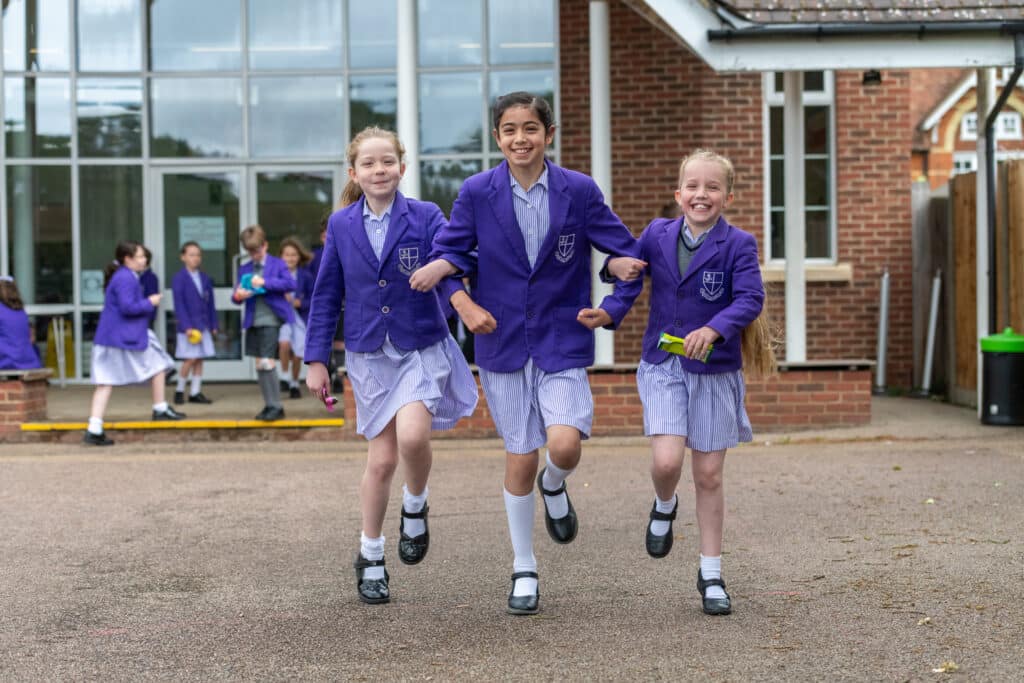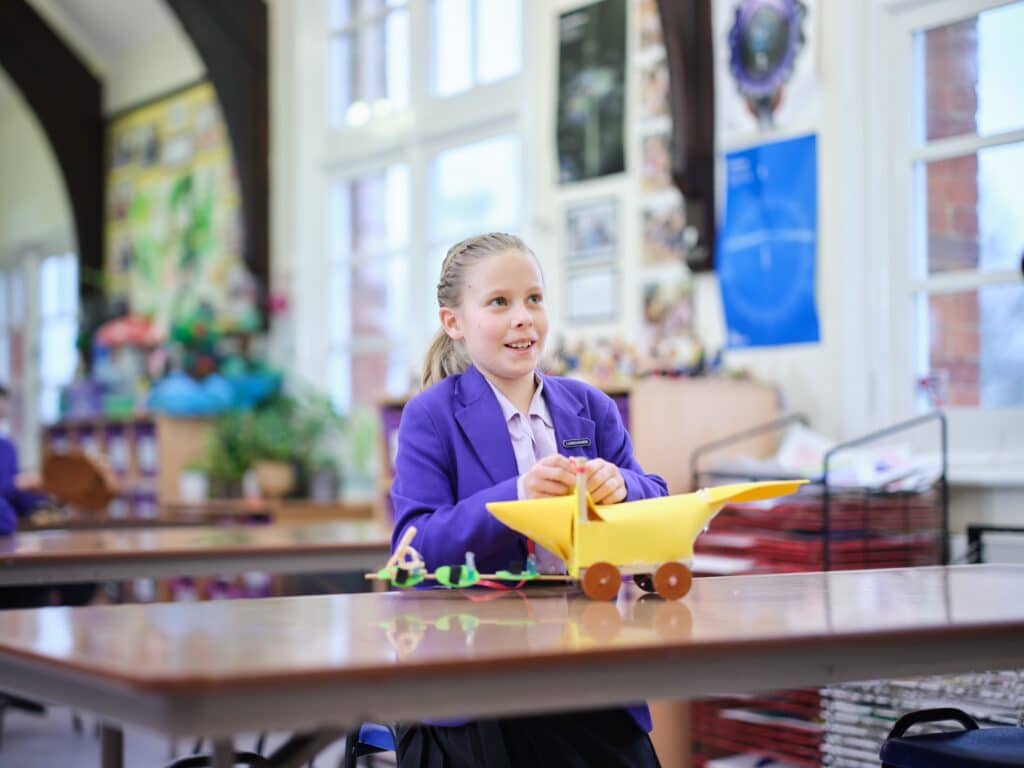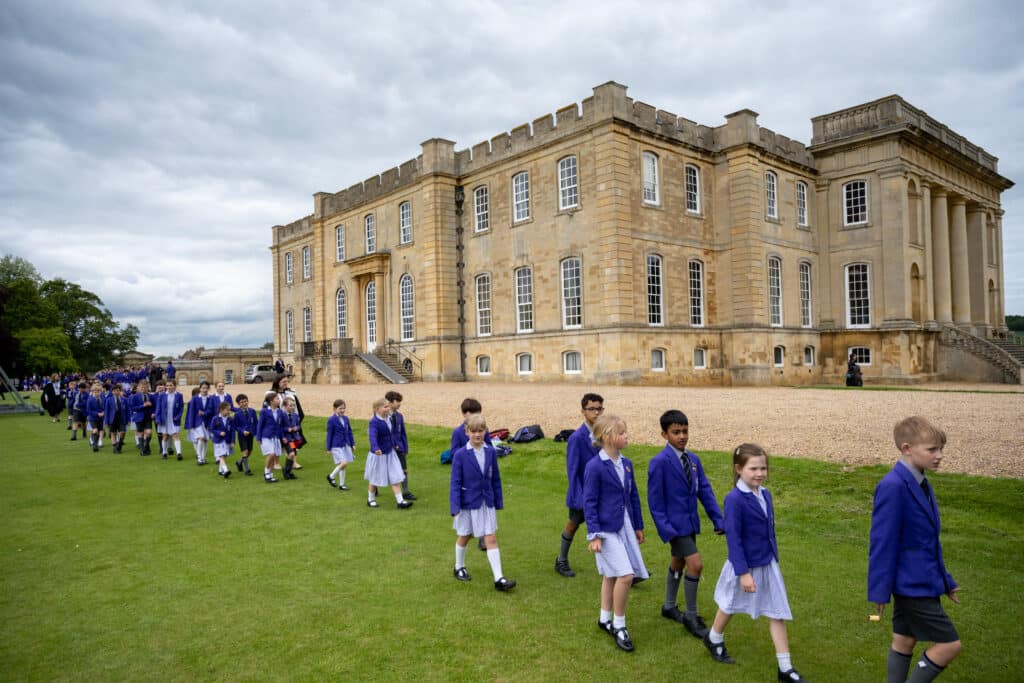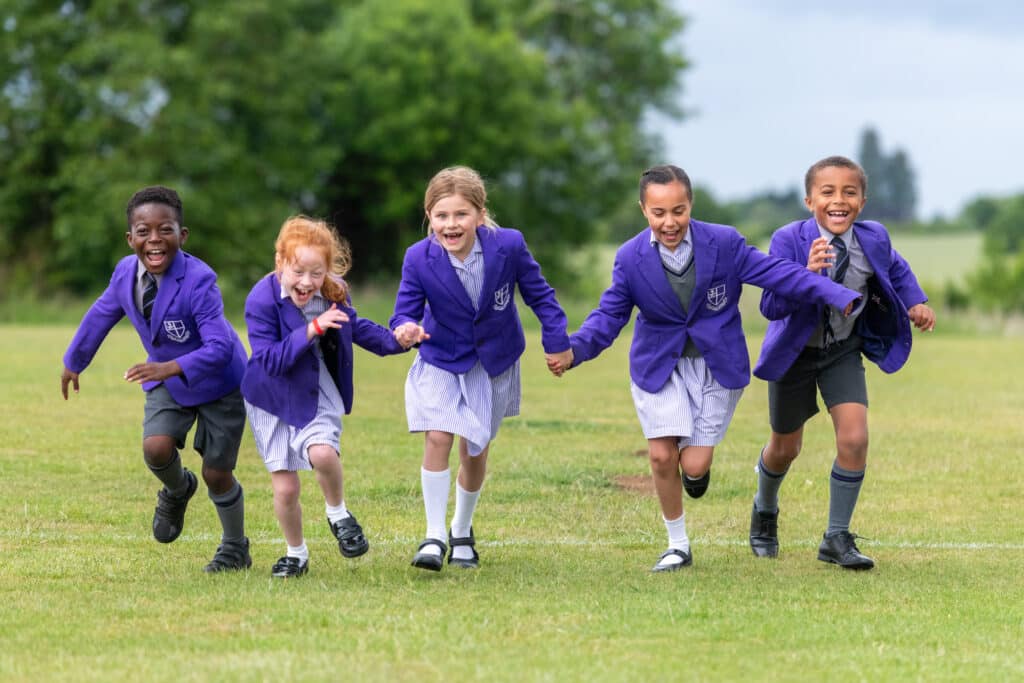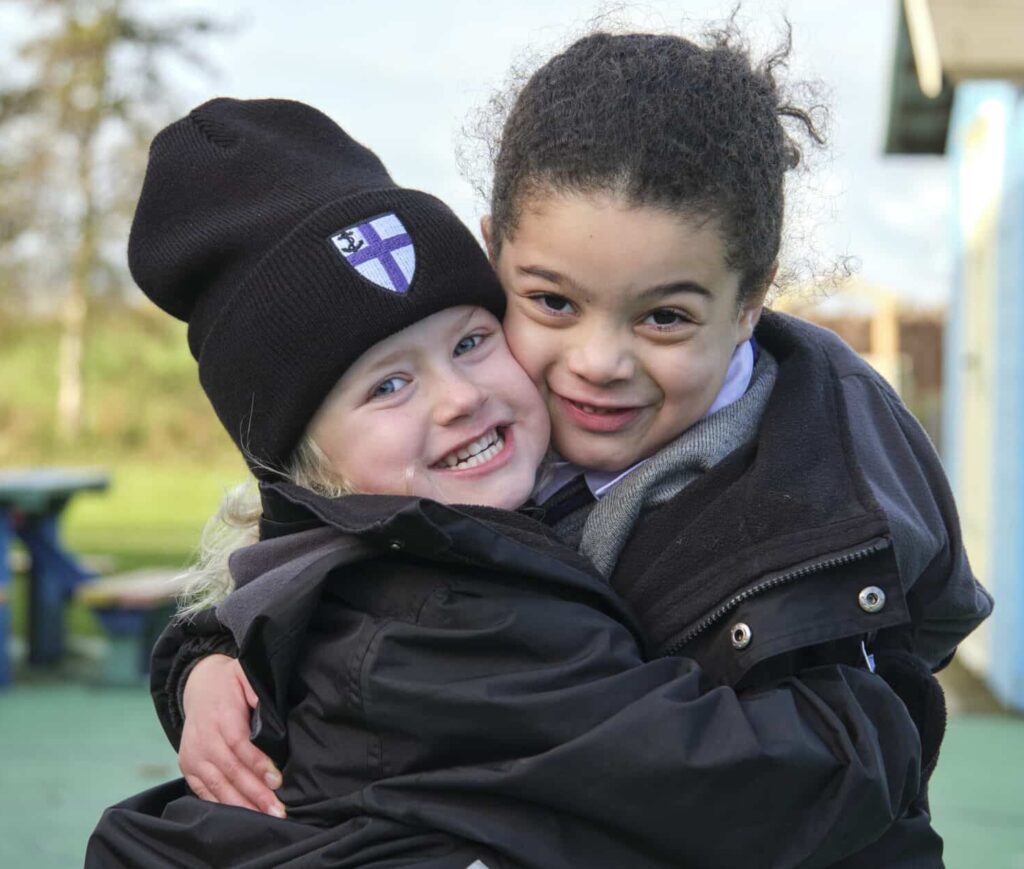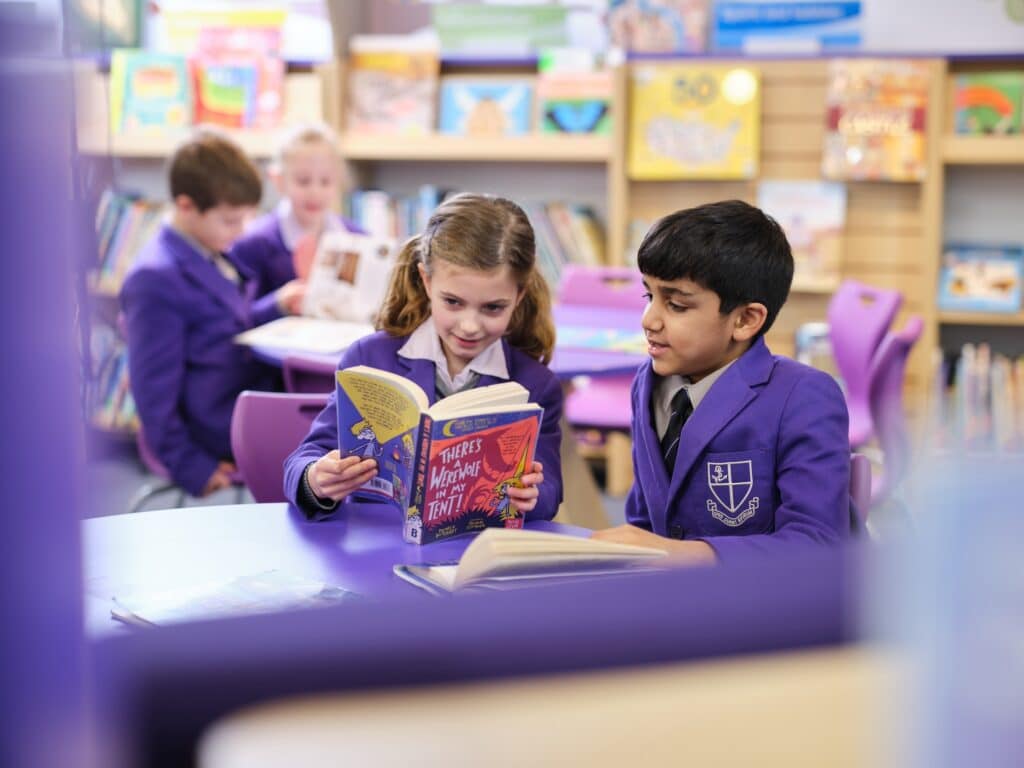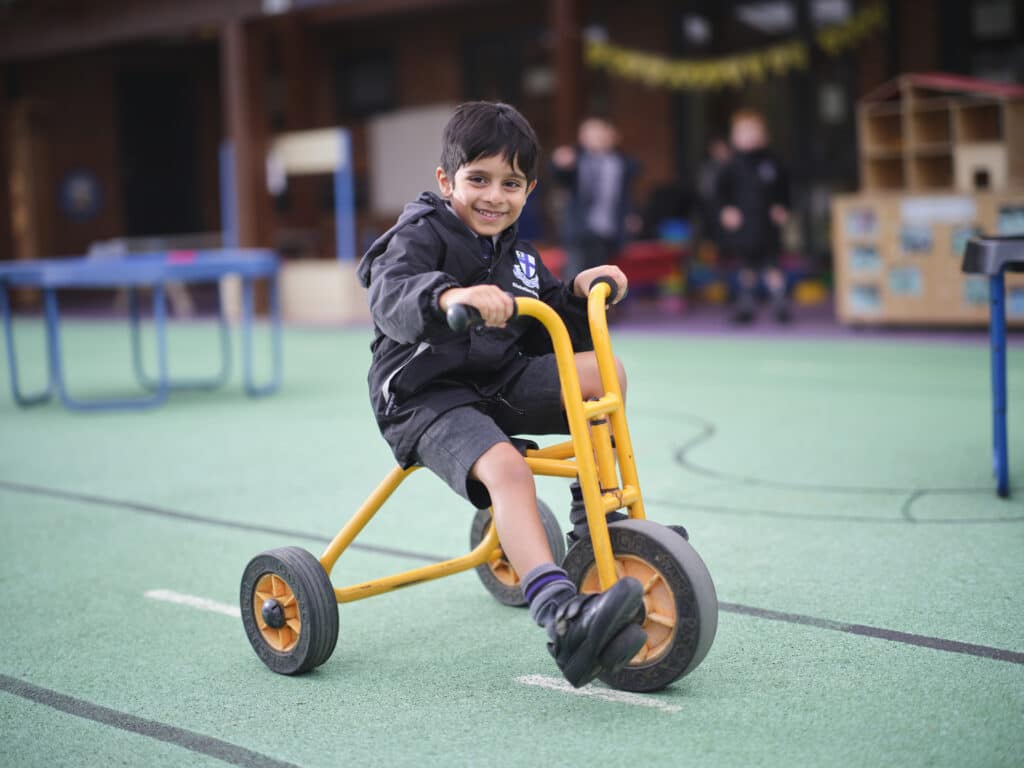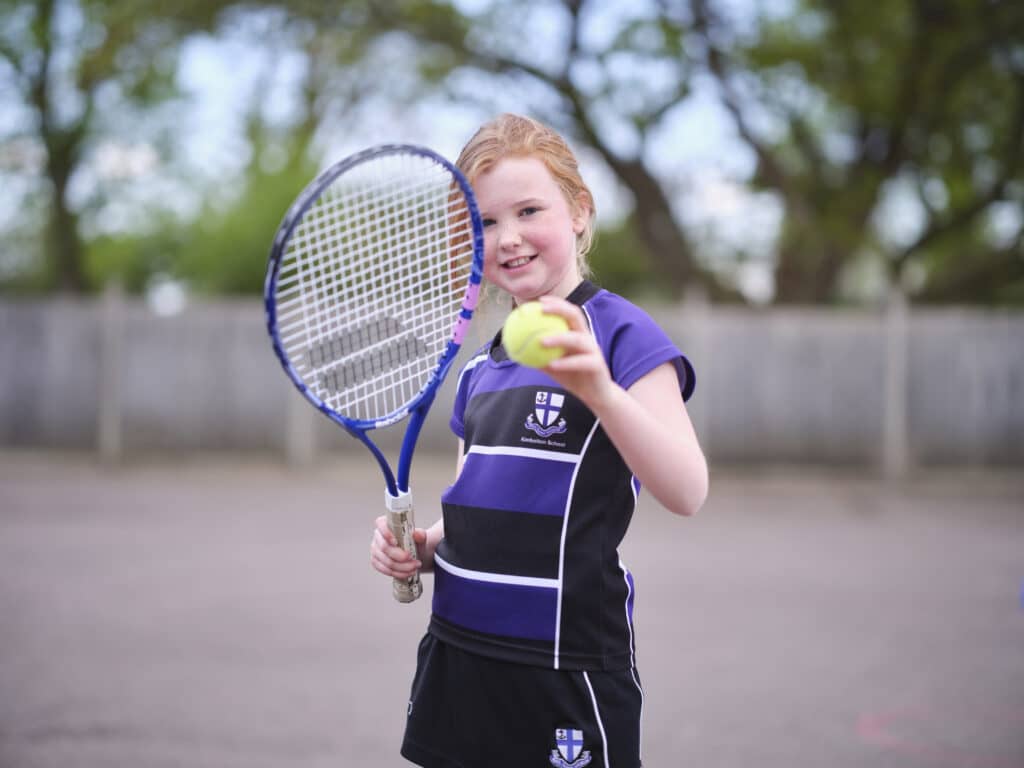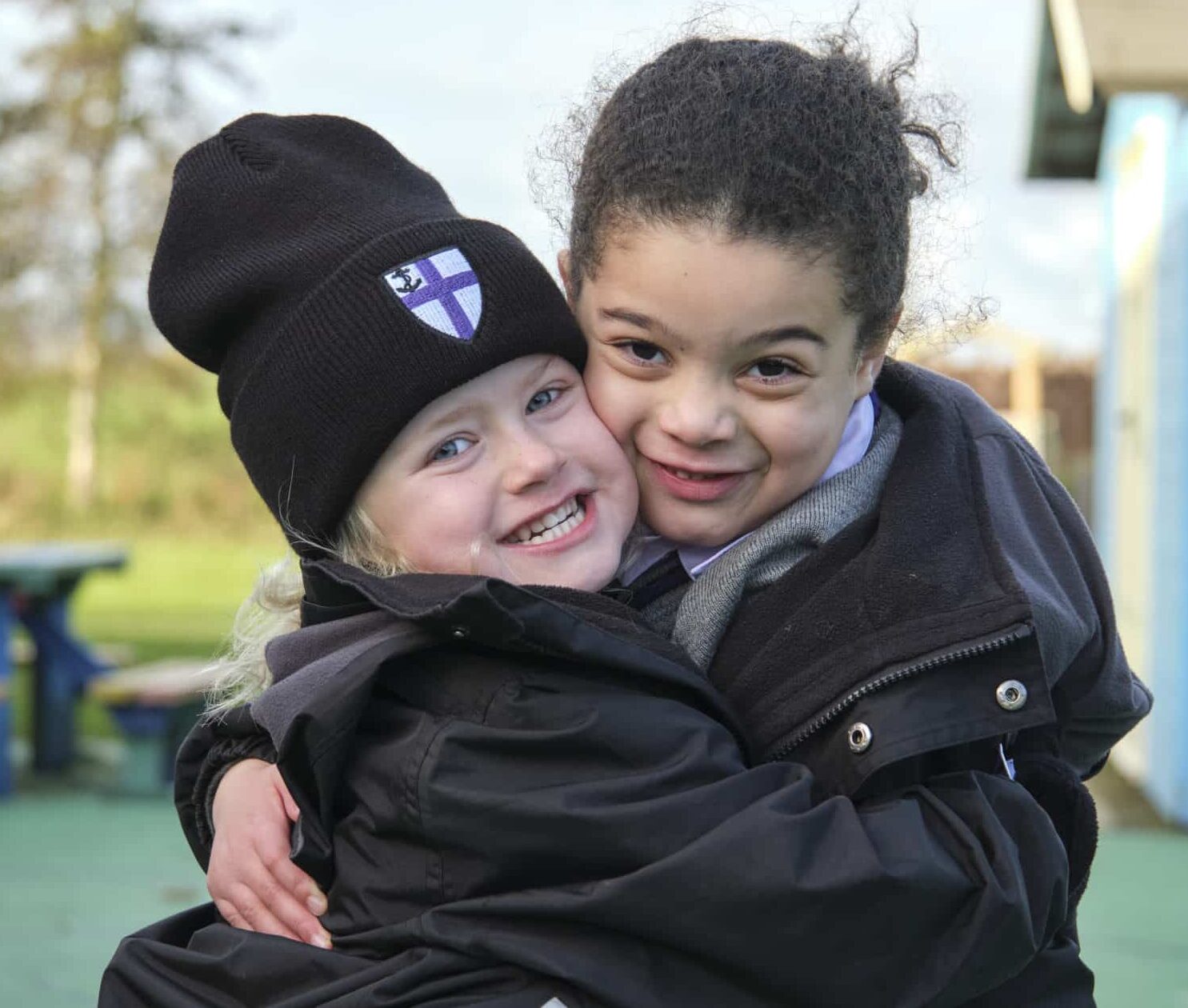
Reception (EYFS)
Welcome to Reception at Kimbolton School
In Reception we follow the Early Years Foundation Stage (EYFS) Curriculum, which sets standards for the learning, development and care of children from birth until the end of the academic year in which they have their fifth birthday.
Our approach is enhanced by the provision of specialist teaching in French, Music, Spanish, PE and Swimming.
We have two indoor classrooms and an outdoor learning environment as well as vast grounds including Squirrel Wood.
A typical day in Reception
Children are welcomed by the Reception team at their classroom door via the playground from 08.25, ready for registration at 08.50 each morning.
The children are encouraged to say goodbye to their parents in the playground and enter classrooms independently, putting their book bag, water bottle and blazer in the correct place.
Continue reading about our day
Welcome activities ensure a calm and productive start, which sets the tone for the rest of the day.
Morning activities are predominantly taken up with mathematics and literacy, with other subjects covered in the afternoon.
A morning snack of fruit and a drink of water or milk is provided before playtime at 10.40am.
Lunchtime begins at 12.00. The children eat in the dining hall and select from a varied menu which includes fruit or a pudding and a drink of water.
A member of staff will be on duty to assist and eat with the children. Staff encourage children to use their knife and fork properly and have good table manners.
The Reception children have their own playground. When the teachers feel they are ready, the children are also allowed to use the Year 1 and 2 playground.
The children attend assemblies every day. On Monday there is a whole school assembly, on Tuesday and Wednesday there is a themed assembly, sometimes led by our school chaplain, Thursday is singing assembly and Friday is achievement assembly.
If your child has a trophy or certificate that has been recently awarded to them at a club from outside school, they may bring this to the Friday assembly. Friday achievement assembly celebrates achievements including the ‘Shiny Trophy Award’ for something extra special.
In the afternoon the children have a drink of water and an afternoon snack. This is usually followed by a class story or circle time before getting ready to go home.
Our Reception curriculum
We offer an enhanced Early Years Curriculum, with specialist teaching in French, Spanish, Music, PE and Swimming in addition to the EYFS Foundation Stage Curriculum. Your child will be learning skills, acquiring new knowledge and demonstrating their understanding through different areas of learning and development inside and outside the classroom.
The Foundation Stage Curriculum has seven areas of learning and provides a solid foundation for children in Reception, preparing them for KS1.
The three prime areas
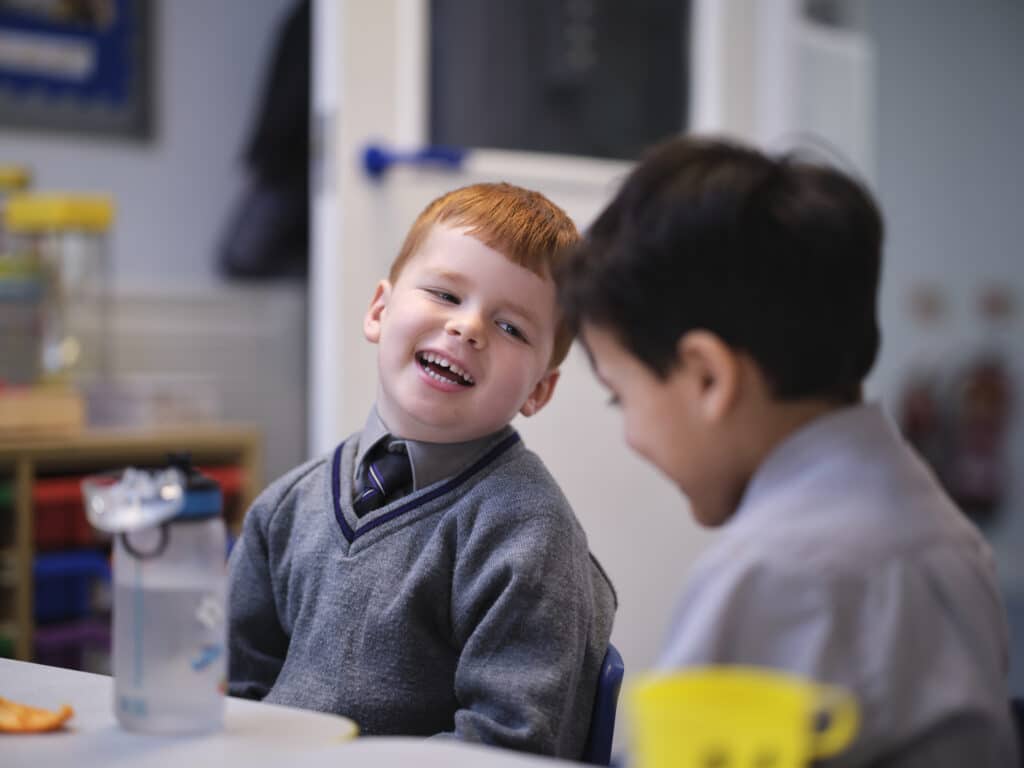
1. Personal, social and emotional development
This focuses on the child learning to work, develop confidence, play, co-operate and respond positively to others in a group beyond the family.
We encourage children to form positive relationships and show sensitivity to their own and others’ needs.
We expect children to regulate their own behaviour and know right from wrong. A positive attitude towards a healthy and active way of life is also emphasised.
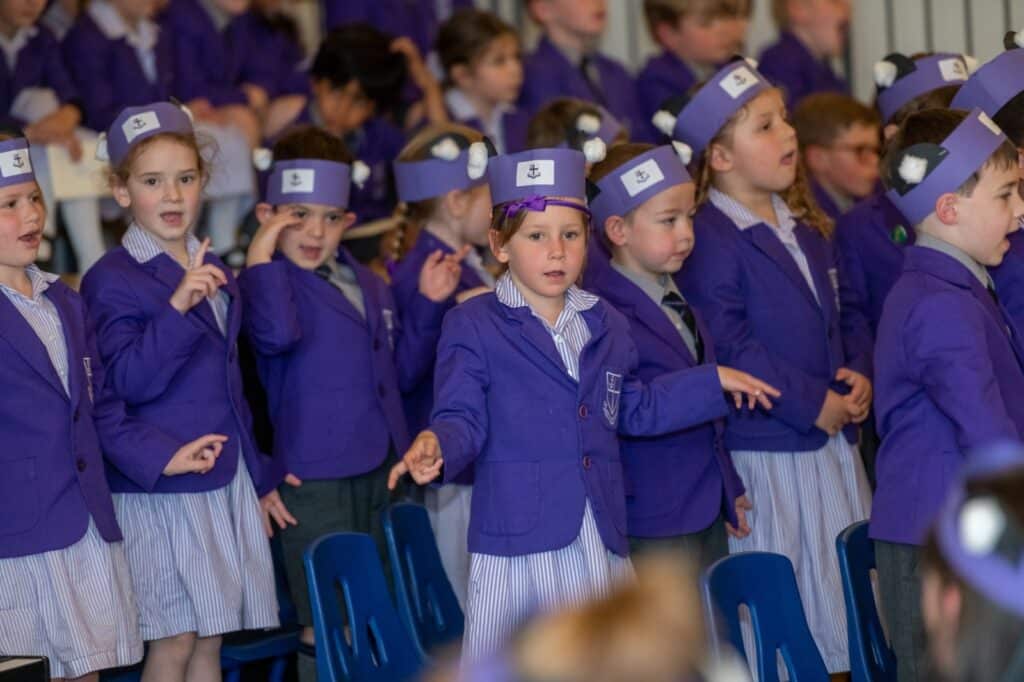
2. Communication and language
This focuses on important aspects of language development and provides a foundation for literacy.
We foster the children’s developing competence in talking, listening, following instructions and having conversations.
We encourage the children to respond and question what they have heard to deepen their understanding, as well as expressing their own ideas and feelings about their experiences.
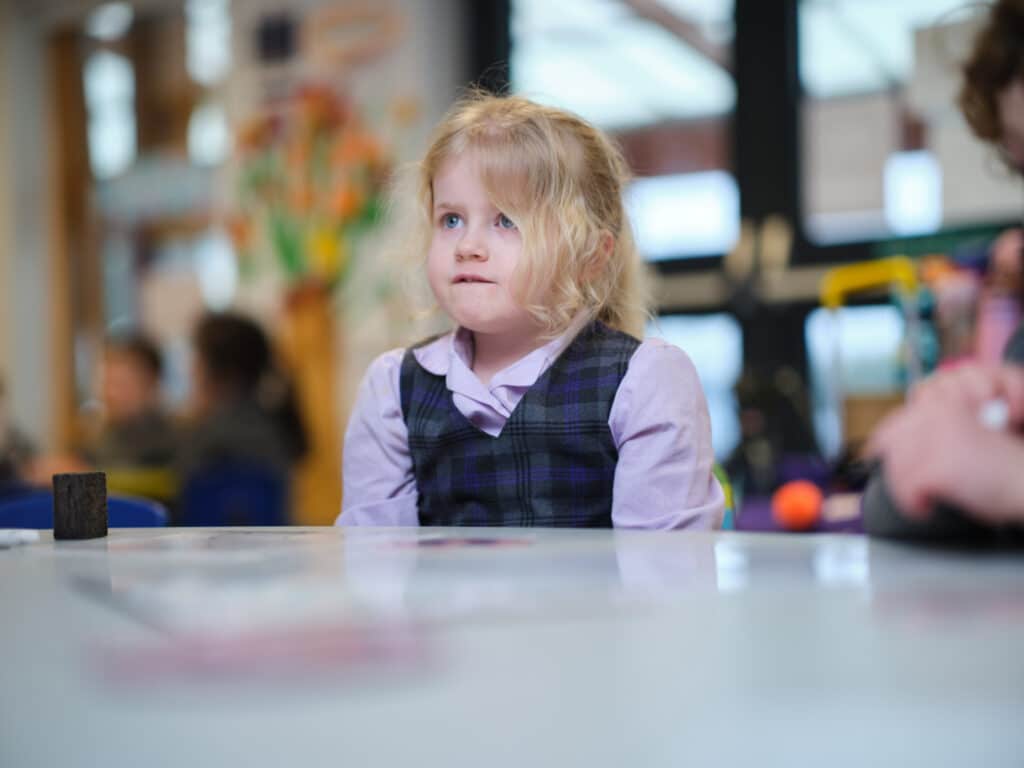
3. Physical development
This focuses on the child developing physical control on both a small and large scale, fine and gross motor skills, and an awareness of space and manipulative skills in indoor and outdoor environments.
The four areas through which the prime areas are strenghtened and applied are:
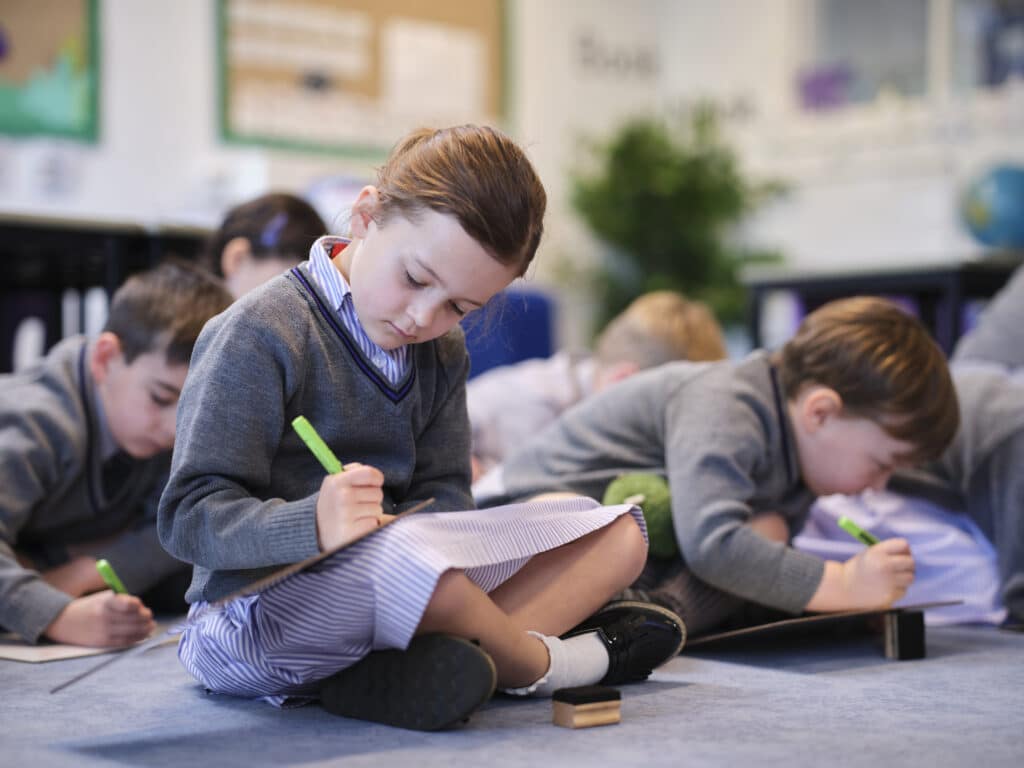
1. Literacy
We foster the children’s developing competence in becoming readers and writers.
Phonic skills are developed by identifying sounds, naming letters and writing phrases and sentences. We follow the Twinkle phonics scheme.
Children are expected to comprehend what they have read from a variety of stories, non-fiction, rhymes and poems.
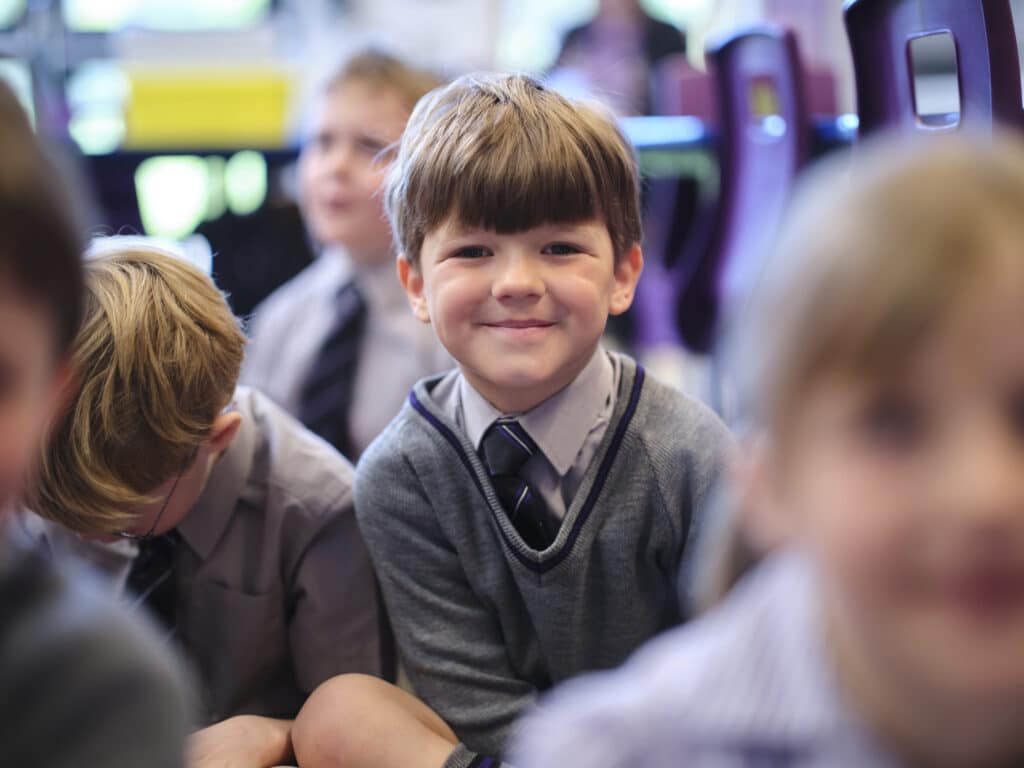
2. Mathematics
This covers important aspects of mathematical understanding of numbers.
The emphasis is on achievement through practical activities and in using and understanding mathematical language, to subitise, recall number facts, compare quantities and compare numbers.
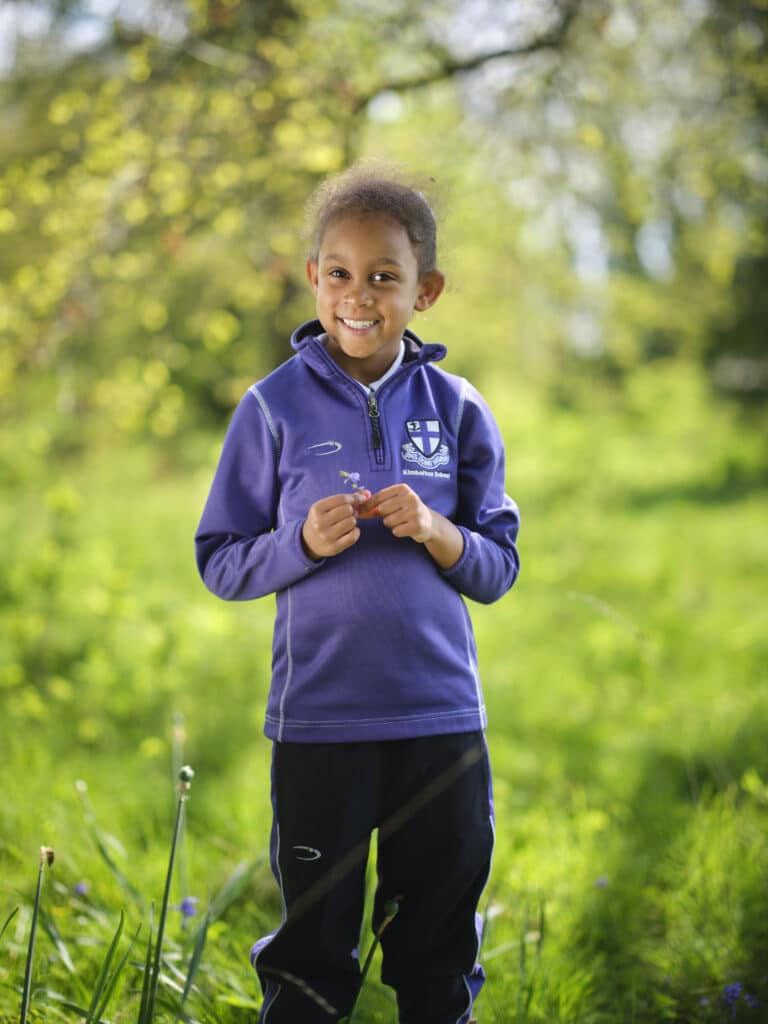
3. Understanding the world
This area focuses on the children’s developing knowledge and understanding of their environment, other people and features of the environment.
It provides a foundation for historical, geographical, scientific and cultural learning. We want the children to develop positive attitudes to discovery and experimentation and to develop the ability to predict, observe and communicate their observations, solve problems and explore the natural world around them.

4. Expressive arts and design
This focuses on the development of the child’s imagination and their ability to express ideas and communicate feelings in creative ways. This expression is encouraged through art, music, dance, stories and imaginative play.
Feedback and progress reports
Formal written reports are sent digitally at the end of the summer term. Parents’ Consultations occur twice a year and enable the class teacher to provide concise feedback on your child’s progress; additional time or appointments can be arranged where necessary.
Tapestry (an online learning journal) is used in Reception to share the ‘wow’ moments. This is a wonderful communication platform for parents and staff to use.
Our values

Kindness
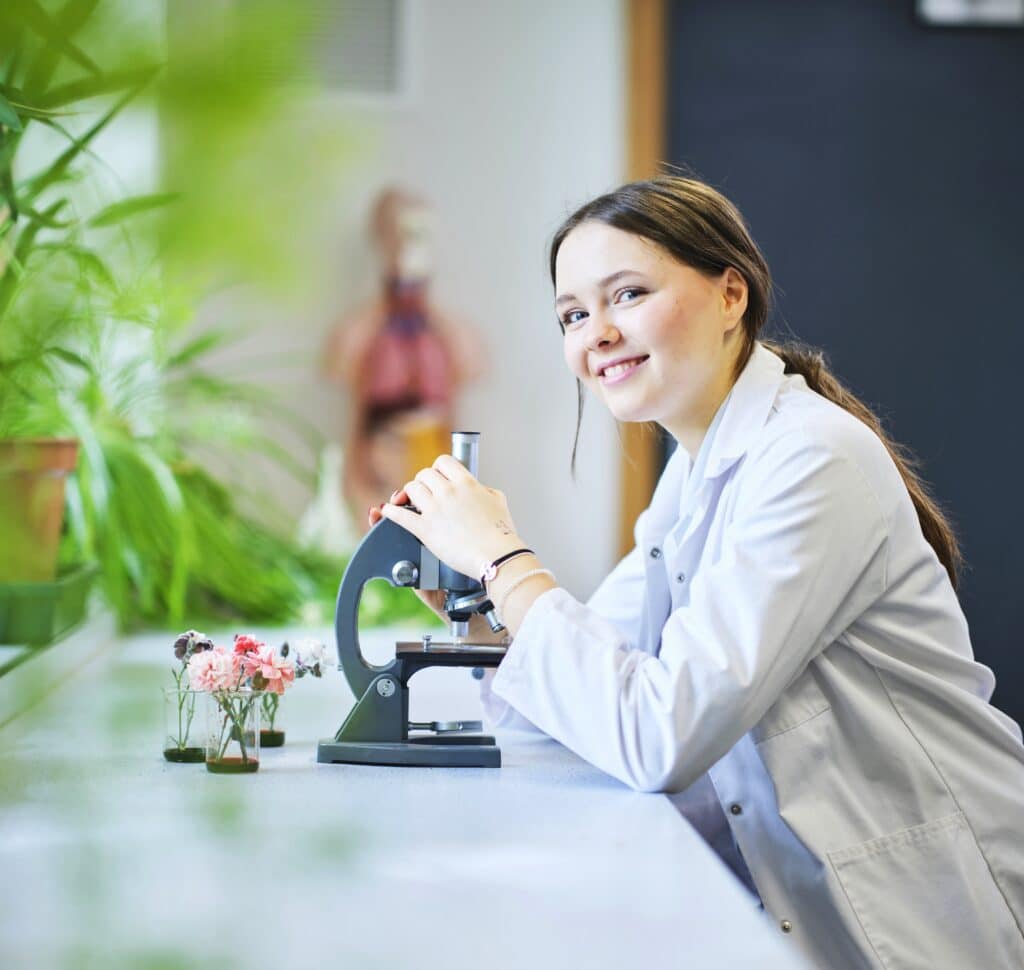
Curiosity
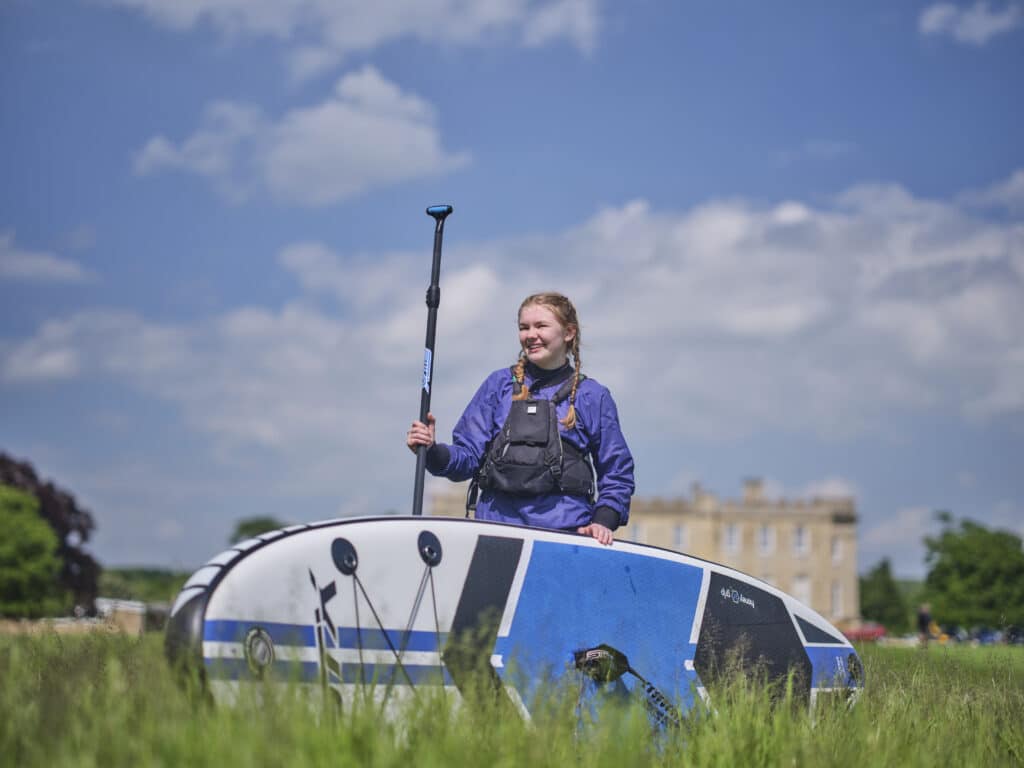
Courage
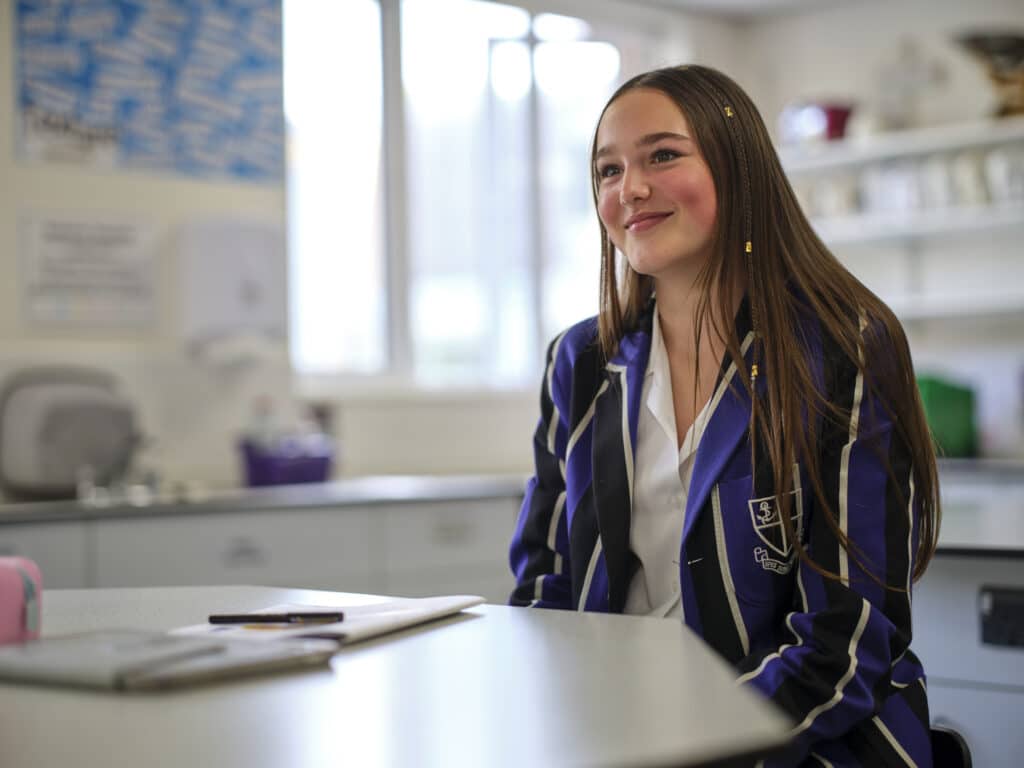
Endeavour
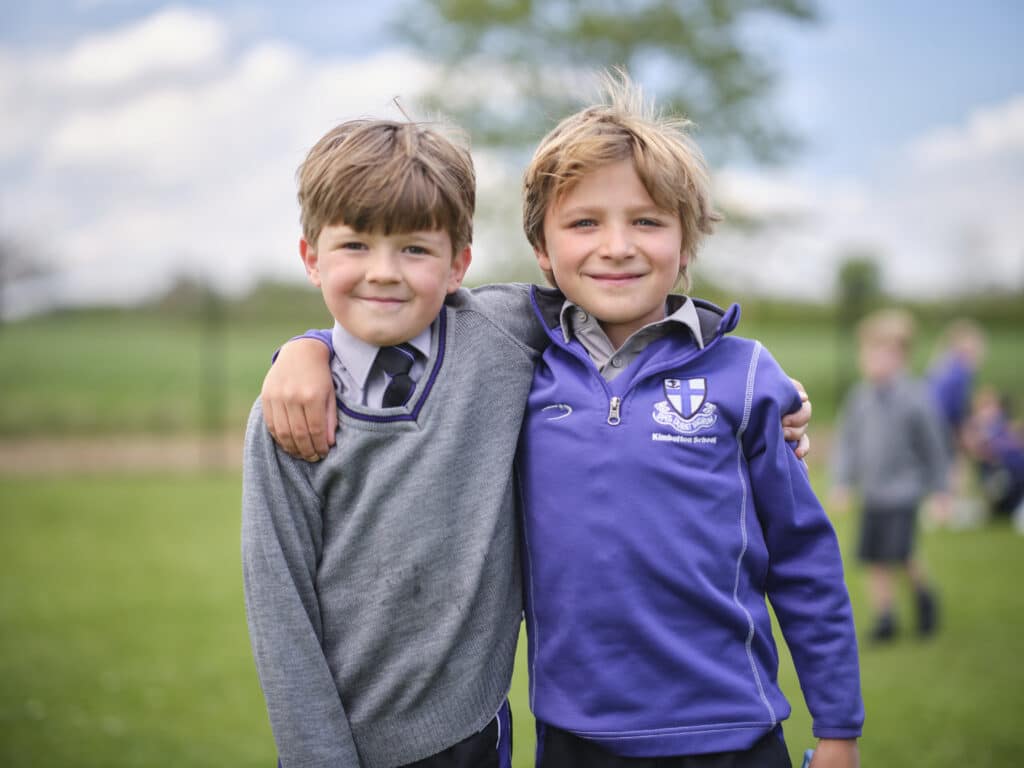
Integrity
EYFS behaviour
We follow the ‘golden rules’ in Reception. If your child forgets the Golden Rules they may need ‘Reflection time’ to think about their actions and what they can do next time.
Golden rules
- We are gentle
- We are kind and helpful
- We listen
- We are honest
- We work hard
- We look after property
Assemblies and class circle times give us opportunities to explore these rules and make sure that all children follow them.
Playground behaviour
All the children are expected to play together in a manner that is friendly and age appropriate. The playground is organised into zones whereby those children who wish to play energetic games or use the bikes/scooters have an area to do so.
There is a construction area, sand, water and mud kitchen, tough trays for imaginative play and a grass play area with climbing equipment.
Children are responsible for treating the equipment respectfully and using it appropriately. If, however, a child does not behave appropriately they will have to have some time out to reflect on their actions. A child who is seen to be very kind or helpful will be praised for following the ‘golden rules’ or showing the school values.
Good behaviour
We promote the school values and follow the golden rules.
We encourage and promote good behaviour at all times and reward children displaying this with praise and stickers.
Examples of good behaviour are often shared in assembly and circle times to illustrate how we expect the children to behave in school. Good attitudes and behaviour are also celebrated in the Lower Prep Friday achievement assembly.
Unacceptable behaviour
A child who acts inappropriately, will be spoken to by a member of staff and the other members of staff will be informed. They will be reminded o the golden rules and the school values. They may benefit from some ‘reflection time’ to think about their behaviour. Staff will advise the children of best next steps to improve their behaviour.
If there is a recurrence or if the behaviour was deemed more serious the child’s parents will be informed.
If desirable behaviour is still not happening, then parents will be asked to come to school to discuss strategies to improve a child’s behaviour. The Head of Prep reserves the right to exclude a pupil whose behaviour is deemed to be unacceptable after all other sanctions have been exhausted.
Guidelines on safe and acceptable behaviour at drop off and pick up
- Parents are responsible for the behaviour of their child until handed over to the teacher in the morning and once the teacher has handed them over to parents at the end of the day.
- Children should remain with parents when waiting for siblings.
- Playground equipment and equipment in the Reception outside area should not be used after normal school hours by pupils or their siblings.
- Parents are responsible for younger children who do not attend the school and must ensure that they do not use equipment belonging to the school.
Our topics
We follow one topic each term. Please talk about topics at home with your child.
If you have anything that may contribute to these themes, then please send them into school with your child to share and celebrate with the rest of Reception. e.g. books, stories, pictures, artefacts.
Our topics are:
- Autumn term: Ourselves and our environment
- Spring term: Animals
- Summer term: Out and about
Curriculum areas
Literacy
Reading
At first your child will have a picture/share book to encourage sharing a book, turning pages and storytelling in their own imaginative ways.
Once they have learnt some sounds in their phonics lessons then they will bring books home with words in that they can decode.
We aim to hear each child read in school twice a week. Once as an individual focused read and, once as part of a group.
Every time your child reads at home or at school a comment should be written in their school diary. The books will be phonic based books where your child can recognise the sounds and familiar words. We usually change reading books twice a week on a Monday and Thursday, but this may differ depending on your child’s development.
Handy hints for home reading:
Talk about the book before your child starts to read. Encourage your child to become more independent when selecting a strategy to tackle an unknown word.
Strategies (things we can do to help us read)
When we come to a word we don’t know, we can:
- Segment; sound out the letters.
- Look at the initial sound.
- Look at the picture.
How to encourage fluency in reading:
- Re-read a sentence and make it sound like talking.
- Read it as if you were a character from the story.
- Look at the punctuation / bold print. How should that be read?
- It is good to continue talking about the books that your child is reading, whether your child has read independently or with you.
Please ensure that reading books and school diaries are in your child’s book bag every day.
Phonics
We follow Twinkle phonics. We begin with Level 1 in the first few weeks of the autumn term and then we progress to Level 2.
We learn new sounds and words each week. Please use your sound cards (provided) at home to reinforce the first set of sounds. We teach children the name of each letter and we practise the sound in addition to an action. We will send weekly parent support sheets home to help your child.
More sounds and words will follow as your children progress with their phonics. We move onto Level 3 when the children have a solid knowledge of the sounds and tricky words from Level 2. We aim to teach Level 3 and 4 in the spring and summer terms.
Useful definitions
- a phoneme is a single unit of sound, for example a, e, p, t.
- a digraph is a combination of two letters representing one sound, for example ee, sh.
- a trigraph is a single sound that is represented by three letters, for example igh, ear.
- Tricky words are those words which cannot be sounded out easily, for example no, go, to, the.
High frequency words; HFW (sometimes known as key words) are those which appear most often in the language, for example the, I, mum and dad.
Handwriting
Preparation for handwriting involves developing:
- Gross motor control: the ability to control the body.
- Fine motor control: the ability to fine-tune the movements of the arm, hand and fingers.
- Visual control: the ability to co-ordinate hand-eye movements.
- Spatial control: the awareness of oneself in space, an awareness of direction (left/right) and plane (horizontal/vertical) and how to transfer that on to paper.
Here are some things you can do at home to develop these key areas at home:
- Play with a ball: kick, catch, throw, bounce.
- Play with hoops, frisbees and stilts (the upside-down flowerpot kind).
- Encourage play on large climbing frames in parks.
- Encourage football and dance-type activities.
- Play with large- scale building kits.
- Enjoy finger rhymes.
- Encourage your child to make and model things (cutting, sticking, moulding, cooking, sewing, threading, etc) using a range of materials (playdough, plasticine, wood etc)
- Encourage your child to experiment with a range of tools and equipment (pens, pencils, crayons, felt tips, scissors, hole punches, tweezers, etc).
- Share jigsaw puzzles and board games.
- Provide opportunities for painting and colouring.
We start by experimenting with the following patterns:
- Straight line patterns – practising vertical straight line patterns teaches your child the correct directional pushes and pulls of the pencil required to form the vertical sticks of letters for all handwriting fonts. Practising horizontal straight line patterns teaches your child the correct directional left to right pushes.
- Curves and tunnels – practising curves and tunnels line patterns teaches your child the correct directional and orientational pushes and pulls of the pencil required to form the curved shapes of letters for all handwriting fonts.
- Diagonals – practising diagonal line patterns teaches your child the correct directional and orientational pushes and pulls of the pencil required to form the diagonal lines of letters for all handwriting fonts.
Enjoy exploring these patterns at home in as many different ways as possible. Make patterns using paint, water, sand, flour, etc- don’t always rush to find a pencil!
Why teach pre-handwriting patterns?
Pre-handwriting patterns help your child to learn the shapes and directional pushes and pulls of the writing tools required to form letters. All letters are a combination of these shapes and lines.
Young children learn many of these directional pushes, pulls and changes in direction on a much larger scale, long before they pick up a pencil, through playing with cars or pretending to cook.
These movements become the drawings/scribbles which young children form once they start mark making, initially as big uncontrolled movements then becoming more controlled and smaller as their gross and fine motor skills develop.
Once the pre-handwriting patterns have been mastered your child will have the skill base necessary, and be more confident, to form letters, numbers and symbols.
Handwriting letters
We will provide a laminated sheet so you can practise with your child. You can use a whiteboard marker on the sheet itself, trace or copy the letters onto paper.
You will see the capital letters and lowercase letters of the alphabet. You will also see a formation guidance mat with common terminology to form each letter supporting your child with correct formations.
Mathematics
We follow the ‘White Rose’ mathematics scheme in line with the Preparatory school. The scheme develops a variety of opportunities to develop the understanding of number, shape, measure and spatial thinking.
It is important that children develop a really strong sense of numbers to 10. This will stand them in good stead for the mathematics that follows as they move through the school. This includes:
- Understanding the link between numbers and quantity.
- Investigating how quantities are composed of smaller parts.
- Knowing how the numbers relate to one another and be able to compare and order them.
- Exploring how quantities change when you add more items or take items away.
Your child may already be able to recite the number names to twenty and beyond but a sense of what those numbers mean develops gradually with repeated experiences in different contexts.
Please use your number cards (provided) at home to consolidate and support your child’s understanding of number.
PSED (Personal, Social and Emotional Development)
PSED is timetabled each week as well as having strong threads throughout all other areas of the curriculum.
This is where children develop their personal, social and emotional skills and learn to self- regulate, managing their own emotions and having a good understanding of their own and others feelings.
We follow the Kapow scheme of work in line with the Preparatory School.
Our themes are:
- Managing self: My wellbeing
- Self- regulation: My feelings
- Building relationships: Special relationships
- Managing self: Taking on challenges
- Self- regulation: Listening and following instructions
- Building relationships: My family and friends
Bee Time
This is a ‘choosing time’ for the children. They can select what they wish to play with and who they play with.
The aim is to encourage independence. If children have forgotten the Golden Rules they may miss some Bee Time as a consequence giving them time to reflect on their behaviour.
Other useful information
Homework books
In the autumn term your child will be given a Homework book. This will be sent home on Friday and will contain two tasks.
Once the tasks have been completed, please return the homework book to school by the Wednesday of the following week.
PE kits
Children need to come into school in their PE kit on their PE day.
Swimming
Children will need to bring a sensible swimming bag into school on their swimming day (TBC), with their school costume/swimming shorts and a towel in. The girls also need to bring a purple school swimming hat.
Swimming will be once a week starting after October half term.
Blazers, coats and wellies
In the corridor your child will have a peg with their name next to it. This is where your child needs to hang their blazer and coat.
Wellies will be stored on the wellington boot rack outside under the covered area.
Rewards
If your child has performed well in any aspect of school life we like to reward them.
In the classroom we give the children stickers for good work or behaviour. They collect these on their sticker cards. When the card is complete they are presented with a certificate.
A shiny trophy is presented to one child from each class each week for something outstanding. This needs to be returned to school on the following Wednesday ready to be presented to the next child.
We also award ‘Value Champion’ shiny pin badges to children who are recognised for achieving the school values. These can be worn in school for a week.
Birthdays
When a child has a birthday in Reception we celebrate at snack time by singing ‘Happy Birthday’. We have a special treat at this time.
Please do not bring any personal treats into school on these occasions due to some children having food allergies.
End of the school day
School ends at 3:30pm each day. If you collect your child at this time please can we request they DO NOT use the play equipment outside at this time.
If your child stays for film or another after school club then collection will be at 4:05pm. After this time your child will need to be booked into Kim club where they can stay until 6pm.
Medication, accients and illness
If medication is required during the school day it should be handed to the Nursing Team at drop off. It should be clearly labelled with your child’s name, in original packaging with pharmacy label if prescribed.
Please contact the Nursing Team for a medication consent form. Without this we cannot administer medication to your child in school.
If your child is injured or unwell during the day and requires a visit to the school nurse you will be informed via Engage or a phone call if necessary.
If your child is prescribed an inhaler or auto injector for allergies or asthma please ensure they have a spare to remain in school. The Nursing Team can be contacted on prepnurse@kimboltonschool.com or 01480 862265 during the school day.
If your child has a fall or a mishap in the playground they may need some TLC from the Reception Team. If they have a cut, scratch or small bump then then it will be dealt with by the Reception Staff and you will receive a green note in your child’s book bag informing you what has happened.
Pre-existing injuries
If your child has an injury at home, please inform a member of the Reception Team either when you arrive with your child in the morning or write a message in their diary.
This would include an indication of the nature of the injury, how it occurred and what medication may have been administered.
This information is vital in case your child has another injury at school which could alter our course of action when assessing the injury.
Communication
Our overriding aim is for your child to be happy at school and able to fulfil their potential.
For this to happen, it is very important that teachers and parents liaise throughout the year.
We will use Tapestry to share ‘wow’ moments and general observations. We request that you look at this regularly and respond with a comment or a ‘like’ signal.
Parent consultation evenings are held in the autumn and spring term, and an end of year report is sent home in the summer term.
Teachers are available to talk to informally at the beginning and end of the school day. If necessary, an appointment can be made at a convenient time for longer conversations.
For other communication please email the school office at prep@kimboltonschool.com including appointments, absences, change of routine for collection etc.
A Termly calendar will be sent home with important dates. The weekly school newsletter and event information is normally sent by e-mail or clarion call (text message).
If you require further information or advice, please do not hesitate to contact your child’s Teacher.
We are looking forward to having a great year with your child.
The use of electronic devices policy
To meet EYFS requirements and to ensure best practice in safeguarding procedures, our Prep is a mobile/tablet-free zone.
Parents and visitors must not use cameras, tablets, or other technologies capable of capturing or storing images inside the building and in the playground areas. If staff see any adult using such a device they will politely request that you refrain from doing so.
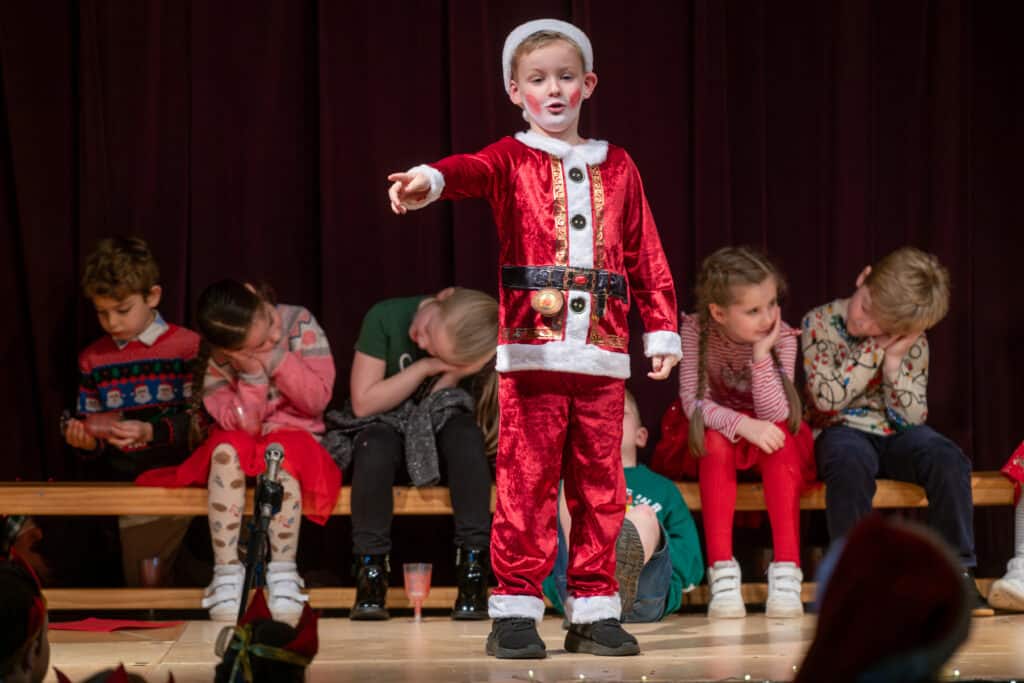
Supporing your child at home
- Be positive, encourage and praise.
- Hear your child read regularly.
- Talk to your child. Allow them to be expressive; listen and question.
- Establish a regular bedtime routine.
- Read a bedtime story with your child whenever possible.
- Play verbal games in the car – I spy, Granny goes to market (for memory), maths questions, spellings, fun activities.
- Play board games.
- Encourage shape and colour recognition in the environment.
- Encourage imaginative play.
- Please check your child’s bookbag on a daily basis.
- Encourage good manners especially at the table.
- Promote good independent toileting and hygiene routines.
- Allow time and space for your child to do their homework.
- If your child is tired at the end of a day at school do not worry about making them read – let them have an early night and relax!
- Enjoy your children and have fun!
Change of circumstances
It is always helpful if you let your child’s teacher know of any changes in home circumstances that might affect your child’s performance or wellbeing. Examples of this could be a parent going away for a period of time for work or having an operation.
